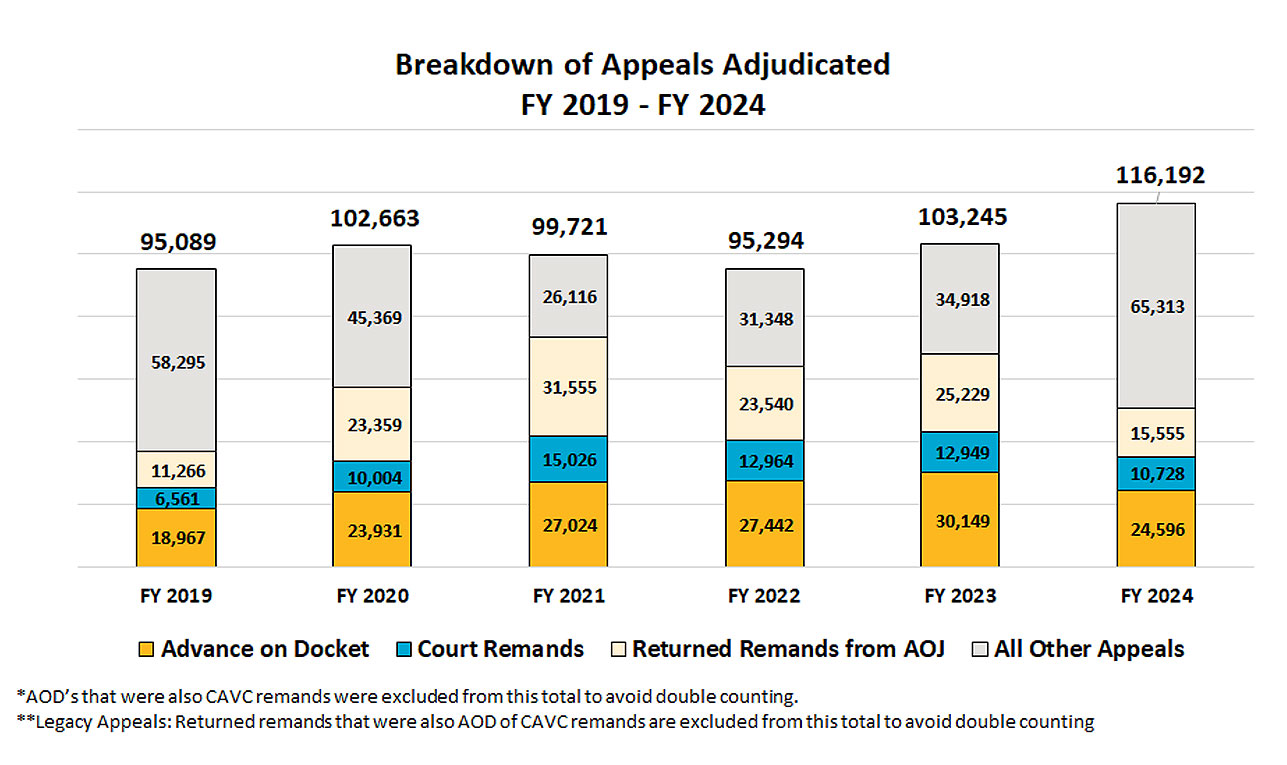Board of Veterans' Appeals
Requirements to Work Cases in Docket Priority Order
By law, the Board must generally decide appeals in the order they are docketed (initially filed) with the Board, except for those cases advanced on the docket for extenuating circumstances set out in statute or cases returned to the Board for expedited processing after remand. More specifically, the docket order addressed in 38 U.S.C. § 7107(a)(1) and maintained by the Board must account for cases that have since been advanced on the docket (AOD), cases that receive expedited treatment on remand from the United States Court of Appeals for Veterans Claims (Court), cases that have been returned to the Board from the Agency of Original Jurisdiction (AOJ) (such as the Veterans Benefits Administration) following remand, and cases that either are awaiting or have had a hearing. Overall, this means cases are generally worked on a first-come, first-served basis. For example, Legacy cases either remanded from the Court or remanded to the AOJ by the Board, maintain their original docket numbers upon return to the Board and generally must be expedited ahead of most other cases. Thousands of cases previously adjudicated by the Board are remanded and returned to the Board each year by the Court. These returned cases move ahead of other first-time appeals awaiting adjudication even though these remanded cases usually don’t result in a different outcome upon re-adjudication by the Board. As you can see below, advanced on docket cases, Court remands, and returned remands have significantly impacted the composition of the Board’s annual workload during recent years:

TITLE GOES HERE
As shown above, many Legacy cases have been remanded to the Board from the Court or returned to the Board by the AOJ after a prior remand from the Board. Because those Legacy remands maintain their original place in line when returned to the Board, the docket order of cases pending can fluctuate greatly. In other words, previously adjudicated Legacy appeals that were remanded and returned to the Board generally must be re-adjudicated ahead of original appeals not previously seen by a judge.
To provide a better understanding of how this impacts how old a case may be and how that in turn impacts the priority for adjudication, roughly 14% of these remanded cases have been remanded 4 times or more and approximately 7% have been remanded 5 times or more.
Despite this challenge, the Board remains committed to deciding the remaining Legacy appeals as expeditiously as possible, while devoting increasing resources to AMA appeal adjudication. For example, the Board has added considerably more Veterans Law Judges, decision-drafting attorneys, and other staff to its rolls to adjudicate higher numbers of AMA decisions being disproportionately displaced by older Legacy system appeals that continuously move to the head of the line after previous remands.
As shown in the graph above, the Board’s significant capacity-building efforts in recent years began paying huge dividends this past year. (See "More Board Personnel Address Pending AMA Appeals and Wait Times”) During FY 2024, the number and percentage of regular Board decisions that did not require expedited treatment nearly doubled to 56% of total output (top part of the bar for “all other appeals”), up from only about 30% in the years prior to FY 2024.
Below are some links that help explain why the appeal wait times grew and what the Board has been doing to improve.
- Workload Challenges of Two Separate Appeals Systems
- Requirements to Work Cases in Docket Priority Order
- More Board Personnel Address Pending AMA Appeals and Wait Times
- AMA Appeals System Shows Improvements Over Older Legacy System
- Veteran Choices for Type of Board Appeal Influences Wait Times
- Better Decision Quality Leading to Fewer Court Appeals
















